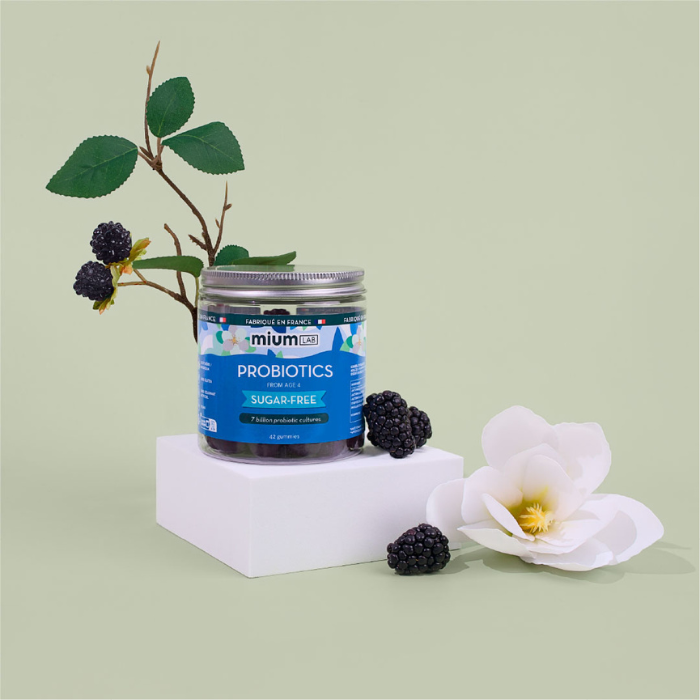Summary
Menstrual pain is widely recognised, but another symptom often goes unnoticed: hormonal migraines. These typically occur at the beginning of the menstrual cycle or in the days leading up to a period. While their origin is commonly linked to fluctuating oestrogen levels, emerging research suggests that a quieter player may also be involved: the gut microbiota.
A growing body of evidence is exploring the connection between the gut flora, systemic inflammation, hormonal balance and neurological health. In this context, probiotics—beneficial live microorganisms—are gaining attention as a complementary strategy to help ease menstrual migraine episodes.
Understanding menstrual migraines
Menstrual migraines are characterised by throbbing, one-sided head pain, often accompanied by nausea, light sensitivity and brain fog. For many, they can be so intense that they interfere with daily life for hours or even days.
They are typically triggered by the sudden drop in oestrogen at the end of the cycle, which can affect cerebral blood vessel dilation and increase sensitivity to pain. But beyond this hormonal shift, researchers are now examining a wider range of risk factors, including low-grade inflammation, gut permeability, microbiota imbalances, and immune system dysfunctions.
In the UK, it’s estimated that around one in five women who experience migraines report a link with their menstrual cycle. (Source: The Migraine Trust, 2023)
The gut–brain–hormone axis: a new area of focus
The gut–brain axis is well established: gut bacteria influence the production of neurotransmitters such as serotonin, which regulate mood, pain perception, and sleep. Many migraines are now thought to involve neuroinflammatory mechanisms.
Around 90% of the body’s serotonin is produced in the gastrointestinal tract. (Source: Mayer EA et al., Nature Reviews Neuroscience, 2015)
This axis also interacts with the endocrine system. Certain bacterial strains can metabolise or modulate oestrogen levels, potentially affecting the intensity and frequency of menstrual symptoms. This three-way link between the gut, brain and hormones is now central to emerging theories on how gut imbalances may contribute to cycle-related migraines.
Gut dysbiosis: a hidden trigger

In women who suffer from migraines, studies have found a higher prevalence of digestive issues, gut dysbiosis (an imbalance between beneficial and harmful bacteria), and raised levels of inflammation. Increased intestinal permeability—often referred to as “leaky gut”—may allow toxins to enter the bloodstream and trigger inflammatory responses affecting the nervous system.
In addition, low bacterial diversity or a lack of protective strains (such as Lactobacillus and Bifidobacterium) may reduce the body’s ability to cope with hormonal fluctuations.

Bloating, sensitive digestion, irregular bowel movements? Our Probiotic Gummies, sugar-free, combine 7 billion live cultures with vitamin B12 to help restore a balanced gut microbiome and relieve daily digestive discomforts from the age of 4.
✅ Eases digestive discomfort
✅ Supports healthy bowel movements
✅ Aids digestion
How probiotics influence inflammation and hormones
Probiotics work on multiple levels: they help strengthen the gut barrier, modulate immune responses, reduce the production of pro-inflammatory cytokines, and contribute to hormonal regulation. Specific strains such as Lactobacillus rhamnosus and Bifidobacterium breve have been shown to reduce pain sensitivity, lower oxidative stress and improve digestive comfort.
A study published in Nutrients (2022) found that supplementation with L. rhamnosus and B. breve over two menstrual cycles helped reduce the intensity of menstrual migraines in women experiencing frequent episodes.
Clinical studies have also shown that certain bacterial strains may help relieve premenstrual symptoms—such as fatigue, pain and bloating—by supporting the elimination of excess oestrogen via the liver and the gut.
Can probiotics help reduce treatment side effects?
Some women use hormonal contraception or preventive medications to manage migraines. These treatments can themselves disrupt the gut microbiota. Probiotics may help prevent side effects such as digestive discomfort or symptoms associated with a sedentary lifestyle.
Diet and migraines: complementary strategies

Experts recommend avoiding certain rich foods that may trigger migraines—particularly those high in histamine, refined sugars or additives. Common trigger foods include processed sauces, aged cheeses, chocolate and red kidney beans.
On the other hand, eating a diet high in fibre, omega-3s and fermented foods may help build a more resilient gut microbiota.
Spotlight: IBS and migraines
Irritable bowel syndrome (IBS) is frequently associated with migraines. This overlap is particularly common in younger women and may point to shared inflammatory pathways. Probiotics may help by reducing gut inflammation, regulating bowel movements and limiting pain signals transmitted to the brain.
Adding probiotics to your routine: when and how?
Probiotics do not produce instant results—most people need a course of 3 to 6 weeks to see meaningful changes in gut health. It’s important to choose a supplement that contains a sufficient number of live organisms (at least 5 to 10 billion CFU per dose), several complementary strains, and a delivery format suited to your needs (e.g. gastro-resistant capsules or high-quality gummies).
The British Society of Gastroenterology recommends a minimum dose of 5 billion CFU per day for 4 weeks to observe benefits. (Source: World Gastroenterology Organisation, 2017)
Ideally, begin your probiotic routine a few days before your period and continue through your cycle. For long-lasting effects, the course can be repeated over several months.

Bloating, sensitive digestion, irregular bowel movements? Our Probiotic Gummies, sugar-free, combine 7 billion live cultures with vitamin B12 to help restore a balanced gut microbiome and relieve daily digestive discomforts from the age of 4.
✅ Eases digestive discomfort
✅ Supports healthy bowel movements
✅ Aids digestion
At Mium Lab, we’ve developed the UK’s most highly dosed probiotic gummies, free from added sugars, combining five rigorously selected lactic acid strains with vitamin B12. With 7 billion live and tyndallised microorganisms per day, they help support smoother digestion, balanced gut flora and improved comfort during hormonal fluctuations. A complete solution to ease digestive issues, support immunity—and potentially reduce the frequency or intensity of menstrual migraines.




